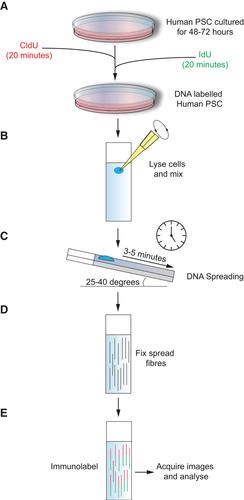下载PDF
{"title":"DNA纤维法分析人多能干细胞DNA复制过程","authors":"Jason A. Halliwell, Polly Gravells, Helen E. Bryant","doi":"10.1002/cpsc.115","DOIUrl":null,"url":null,"abstract":"<p>Human pluripotent stem cells (PSC) acquire recurrent chromosomal instabilities during prolonged in vitro culture that threaten to preclude their use in cell-based regenerative medicine. The rapid proliferation of pluripotent cells leads to constitutive replication stress, hindering the progression of DNA replication forks and in some cases leading to replication-fork collapse. Failure to overcome replication stress can result in incomplete genome duplication, which, if left to persist into the subsequent mitosis, can result in structural and numerical chromosomal instability.</p><p>We have recently applied the DNA fiber assay to the study of replication stress in human PSC and found that, in comparison to somatic cells states, these cells display features of DNA replication stress that include slower replication fork speeds, evidence of stalled forks, and replication initiation from dormant replication origins. These findings have expanded on previous work demonstrating that extensive DNA damage in human PSC is replication associated. In this capacity, the DNA fiber assay has enabled the development of an advanced nucleoside-enriched culture medium that increases replication fork progression and decreases DNA damage and mitotic errors in human PSC cultures.</p><p>The DNA fiber assay allows for the study of replication fork dynamics at single-molecule resolution. The assay relies on cells incorporating nucleotide analogs into nascent DNA during replication, which are then measured to monitor several replication parameters. Here we provide an optimized protocol for the fiber assay intended for use with human PSC, and describe the methods employed to analyze replication fork parameters. © 2020 Wiley Periodicals LLC.</p><p><b>Basic Protocol 1</b>: DNA fiber labeling</p><p><b>Basic Protocol 2</b>: DNA fiber spreading</p><p><b>Basic Protocol 3</b>: Immunostaining</p><p><b>Support Protocol 1</b>: Microscopy/data acquisition</p><p><b>Support Protocol 2</b>: Data analysis</p>","PeriodicalId":53703,"journal":{"name":"Current Protocols in Stem Cell Biology","volume":"54 1","pages":""},"PeriodicalIF":0.0000,"publicationDate":"2020-06-25","publicationTypes":"Journal Article","fieldsOfStudy":null,"isOpenAccess":false,"openAccessPdf":"https://sci-hub-pdf.com/10.1002/cpsc.115","citationCount":"9","resultStr":"{\"title\":\"DNA Fiber Assay for the Analysis of DNA Replication Progression in Human Pluripotent Stem Cells\",\"authors\":\"Jason A. Halliwell, Polly Gravells, Helen E. Bryant\",\"doi\":\"10.1002/cpsc.115\",\"DOIUrl\":null,\"url\":null,\"abstract\":\"<p>Human pluripotent stem cells (PSC) acquire recurrent chromosomal instabilities during prolonged in vitro culture that threaten to preclude their use in cell-based regenerative medicine. The rapid proliferation of pluripotent cells leads to constitutive replication stress, hindering the progression of DNA replication forks and in some cases leading to replication-fork collapse. Failure to overcome replication stress can result in incomplete genome duplication, which, if left to persist into the subsequent mitosis, can result in structural and numerical chromosomal instability.</p><p>We have recently applied the DNA fiber assay to the study of replication stress in human PSC and found that, in comparison to somatic cells states, these cells display features of DNA replication stress that include slower replication fork speeds, evidence of stalled forks, and replication initiation from dormant replication origins. These findings have expanded on previous work demonstrating that extensive DNA damage in human PSC is replication associated. In this capacity, the DNA fiber assay has enabled the development of an advanced nucleoside-enriched culture medium that increases replication fork progression and decreases DNA damage and mitotic errors in human PSC cultures.</p><p>The DNA fiber assay allows for the study of replication fork dynamics at single-molecule resolution. The assay relies on cells incorporating nucleotide analogs into nascent DNA during replication, which are then measured to monitor several replication parameters. Here we provide an optimized protocol for the fiber assay intended for use with human PSC, and describe the methods employed to analyze replication fork parameters. © 2020 Wiley Periodicals LLC.</p><p><b>Basic Protocol 1</b>: DNA fiber labeling</p><p><b>Basic Protocol 2</b>: DNA fiber spreading</p><p><b>Basic Protocol 3</b>: Immunostaining</p><p><b>Support Protocol 1</b>: Microscopy/data acquisition</p><p><b>Support Protocol 2</b>: Data analysis</p>\",\"PeriodicalId\":53703,\"journal\":{\"name\":\"Current Protocols in Stem Cell Biology\",\"volume\":\"54 1\",\"pages\":\"\"},\"PeriodicalIF\":0.0000,\"publicationDate\":\"2020-06-25\",\"publicationTypes\":\"Journal Article\",\"fieldsOfStudy\":null,\"isOpenAccess\":false,\"openAccessPdf\":\"https://sci-hub-pdf.com/10.1002/cpsc.115\",\"citationCount\":\"9\",\"resultStr\":null,\"platform\":\"Semanticscholar\",\"paperid\":null,\"PeriodicalName\":\"Current Protocols in Stem Cell Biology\",\"FirstCategoryId\":\"1085\",\"ListUrlMain\":\"https://onlinelibrary.wiley.com/doi/10.1002/cpsc.115\",\"RegionNum\":0,\"RegionCategory\":null,\"ArticlePicture\":[],\"TitleCN\":null,\"AbstractTextCN\":null,\"PMCID\":null,\"EPubDate\":\"\",\"PubModel\":\"\",\"JCR\":\"Q2\",\"JCRName\":\"Biochemistry, Genetics and Molecular Biology\",\"Score\":null,\"Total\":0}","platform":"Semanticscholar","paperid":null,"PeriodicalName":"Current Protocols in Stem Cell Biology","FirstCategoryId":"1085","ListUrlMain":"https://onlinelibrary.wiley.com/doi/10.1002/cpsc.115","RegionNum":0,"RegionCategory":null,"ArticlePicture":[],"TitleCN":null,"AbstractTextCN":null,"PMCID":null,"EPubDate":"","PubModel":"","JCR":"Q2","JCRName":"Biochemistry, Genetics and Molecular Biology","Score":null,"Total":0}
引用次数: 9
引用
批量引用
DNA Fiber Assay for the Analysis of DNA Replication Progression in Human Pluripotent Stem Cells
Human pluripotent stem cells (PSC) acquire recurrent chromosomal instabilities during prolonged in vitro culture that threaten to preclude their use in cell-based regenerative medicine. The rapid proliferation of pluripotent cells leads to constitutive replication stress, hindering the progression of DNA replication forks and in some cases leading to replication-fork collapse. Failure to overcome replication stress can result in incomplete genome duplication, which, if left to persist into the subsequent mitosis, can result in structural and numerical chromosomal instability.
We have recently applied the DNA fiber assay to the study of replication stress in human PSC and found that, in comparison to somatic cells states, these cells display features of DNA replication stress that include slower replication fork speeds, evidence of stalled forks, and replication initiation from dormant replication origins. These findings have expanded on previous work demonstrating that extensive DNA damage in human PSC is replication associated. In this capacity, the DNA fiber assay has enabled the development of an advanced nucleoside-enriched culture medium that increases replication fork progression and decreases DNA damage and mitotic errors in human PSC cultures.
The DNA fiber assay allows for the study of replication fork dynamics at single-molecule resolution. The assay relies on cells incorporating nucleotide analogs into nascent DNA during replication, which are then measured to monitor several replication parameters. Here we provide an optimized protocol for the fiber assay intended for use with human PSC, and describe the methods employed to analyze replication fork parameters. © 2020 Wiley Periodicals LLC.
Basic Protocol 1 : DNA fiber labeling
Basic Protocol 2 : DNA fiber spreading
Basic Protocol 3 : Immunostaining
Support Protocol 1 : Microscopy/data acquisition
Support Protocol 2 : Data analysis



